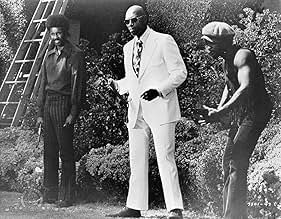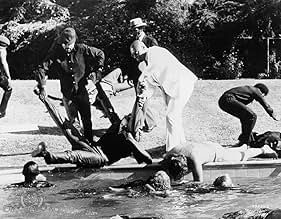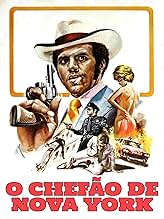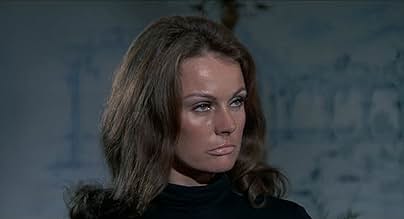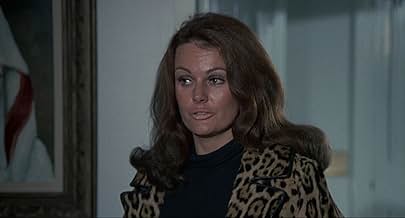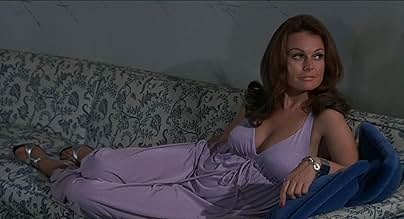Elevé à Harlem, Tommy Gibbs devient un chef de mafia prospère, mais il se heurte à la mafia rivale et à son vieil ennemi, le ripou McKinney.Elevé à Harlem, Tommy Gibbs devient un chef de mafia prospère, mais il se heurte à la mafia rivale et à son vieil ennemi, le ripou McKinney.Elevé à Harlem, Tommy Gibbs devient un chef de mafia prospère, mais il se heurte à la mafia rivale et à son vieil ennemi, le ripou McKinney.
- Réalisation
- Scénario
- Casting principal
- Mr. Gibbs
- (as Julius W. Harris)
- 'Motor'
- (as Allen W. Bailey)
- Cab Driver
- (as Francisco DeGracia)
Avis à la une
The narrative is a story told over, which focuses on a person who looses everything in the pursuit of power, including childhood friends, wives, and particularly looses sight of the person that they are. It's always great to watch a Cohen movie from this period. When filming in the streets (in this case New York - of which is his usual setting), his guerilla-style is self evident: clearly in the making of these films, Cohen does not get any kind of permission to film, he simply turns up and does it. In one scene, Williamson has been shot, the camera follows him down the busy street from a roof top, and passers by seem to want to help him. It's these elements of exploitation cinema that I embrace.
Whilst this is certainly not one of Cohen's greatest (check out his horror output for some terrifically socio-political subtexts), the film oozes charm. Not only do we have the easy-cool of Fred Williamson, the film also has the ubiquitous Gloria Hendry , although not in her usual kung-fu-influenced fighting mode. Even though this film is less well known than Shaft or Superfly (1972), who's soundtracks were composed by soul giants Isaac Hayes and Curtis Mayfield respectively, Black Caesar's soundtrack is provided by the godfather of soul himself, James Brown: Break it down! Heeyyyyaa!!
www.the-wrath-of-blog.blogspot.com
Le saviez-vous
- AnecdotesWhile filming in Harlem, Larry Cohen was accosted by local gangsters who threatened to disrupt the shoot unless they were paid off. Instead, Cohen offered them small roles in the film. They helped so enthusiastically that they attended the premiere to sign autographs.
- GaffesTommy cuts off the left ear of the man in the barber's chair, but the ear he drops into the plate of spaghetti is a right ear.
- Citations
Tommy Gibbs: That used to be home, sweet home, Pa. Top window. Rear
Mr. Gibbs: Always seemed to me like a much bigger building.
Tommy Gibbs: You must know what I do for a living.
Mr. Gibbs: I'm not gonna lecture you. I don't have the right.
Tommy Gibbs: Did it ever occur to you... That I've been waiting 25 years just to kill you?
Mr. Gibbs: No. No. Wait, listen please. I mean, it was the depression. I mean, you don't know what it was like to... Then the war and my chance to get away. You never had those responsibilities. I mean, you never been trapped. Oh, no. Not knowing where to run or who to-- or who to hate. I was 20 years old, 20 years old when I enlisted. And I was a cook all through the war. I was a cook!
Tommy Gibbs: You never sent home one allotment check. My ma had to scrub floors on her hands and knees for pennies!
[pins his father against a wall pointing his gun at him]
Tommy Gibbs: I'm gonna kill you!
Mr. Gibbs: She-- she couldn't get no allotment! We wasn't married legal! Folks didn't bother much in those days.
Tommy Gibbs: [lowers his gun and turns away] She never told me.
Mr. Gibbs: I--I could have sent you something.
Tommy Gibbs: Go on. Start walkin.'
Mr. Gibbs: I didn't mean to break it to you that way. I mean, I wouldn't have said anything...
Tommy Gibbs: Don't matter. Move on, before I change my mind. Pa! I don't ever want to see you again.
Mr. Gibbs: I understand, son.
Reverend Rufus: What are you going to do now? Kill your momma?
- Versions alternativesThe European version included an additional scene before the end credits, where, after Tommy Gibbs is seen wandering in a neighborhood slum, a street gang robs him and fatally beats him up. This sequence was originally cut from U.S. prints, as AIP was already interested in making a sequel. However, in the late 1990s, when MGM bought the Orion Pictures library, the European cut made its way to home video, due to a mix-up on MGM's part. Therefore, all current video releases, to this day, feature this print.
- ConnexionsFeatured in Casse dans la ville (1973)
Meilleurs choix
- How long is Black Caesar?Alimenté par Alexa
Détails
Contribuer à cette page



